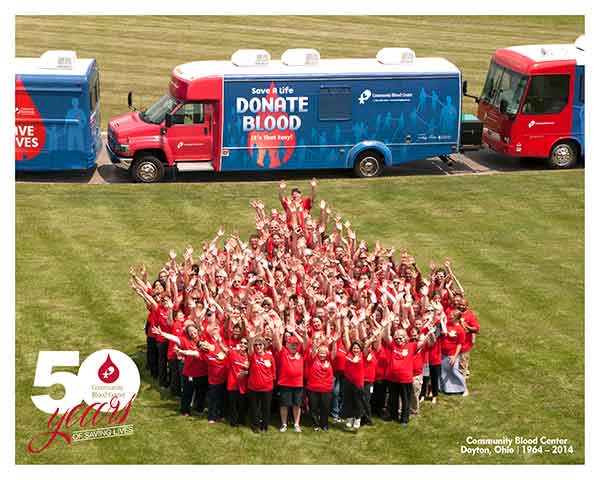|
|
 |
|
CBC Celebrates
50 Years of Saving Lives
DAYTON, Ohio - Patients arriving at Dayton hospitals in the early
1960’s with traumatic injury or in need of major surgery faced
desperate uncertainties practically unheard of in America today.
Did the hospital have enough blood? Was it a compatible blood
type? Could they get the blood needed in time?
A new era in patient care began Sept. 14, 1964 when Community Blood
Center (CBC) opened the doors of the region’s first central blood
bank. On Sept. 14, 2014 CBC will celebrate its golden anniversary
with pride, honoring all who have contributed to a now 50-year legacy
of saving lives.
CBC is marking the milestone with a public awareness campaign,
celebrations that included the assembly of staff members to form “a
human blood drop,” and special edition t-shirts featuring the 50th
anniversary logo for employees and donors.
This anniversary year has been a time for CBC to look back and honor
the vision of its co-founders Dr. Ludolph H. van der Hoeven of Good
Samaritan Hospital and Dr. James W. Funkhouser of Miami Valley
Hospital, who together with Dr. Ross H. Seasly of Kettering Hospital
served as CBC’s original medical directors.
How did the founders know when they were ready? Dr. van der
Hoeven is now 95 and has outlived his friend Dr. Funkhouser. But
he remembers the decision with absolute clarity: “We said it. And we
did it. We saw it through.”
They were members of the original study committee appointed by the
Medical Society of Montgomery County with the goal of establishing a
central blood bank to eventually serve Dayton’s five hospitals.
At the time, hospitals typically operated their own blood banks.
Supply could fluctuate wildly, and in extreme cases a patient’s family
members might be asked to donate on the spot. Hospitals struggled
to meet demand by trading blood units back and forth, using cumbersome
communications and record keeping.
“The crowning jewel is that we got hospitals to work together,”
recalled Dr. van der Hoeven. “Hospitals are competitive – they
cannot agree. But in this instance we got them to work together, which
was a major diplomatic achievement.”
On Sept. 14, 1964 Mrs. Barbara Bartley of Dayton made the historic
first donation at CBC’s new home in the basement of the Fidelity
Medical Building at the corner of Fifth and Main in downtown
Dayton. She told the Dayton Daily News she learned the value of
blood donations when friends and family were called on to donate 25
pints of blood for her husband’s open heart surgery a year
earlier. He survived the surgery but died four months later.
“It’s one way I can help someone else,” she said.
In just over a year CBC drew 11,000 units from 8,000 donors. Staff size
grew from four original employees to 24, and the number of donors
coming through the door each month soared from 37 the first month to
1,200 in October of 1965.
Those numbers are now dwarfed by CBC’s modern blood services standards.
In 2013, CBC collected 68,713 red cell donations and saw apheresis
donations grow to 8,552 for a total of more than 103,000
transfusions. CBC supplies blood products to 25 partner hospitals
in a 15-county service area of western Ohio and eastern Indiana.
CBC’s original charter envisioned the eventual expansion into tissue
banking. The Dayton Regional Tissue Bank was introduced in 1986
and later became Community Tissue Services. The Center for
Tissue, Innovation and Research opened in Kettering in 2011, and in
2013 processed 269,520 bone and skin grafts for transplantation
worldwide.
CBC/CTS now has 572 employees, with nearly half the staff working in
tissue branches across the country.
While CBC/CTS pauses to celebrate the achievements of the last 50
years, it is also a time to focus on the exciting challenges to come.
“Clearly in the future we will continue to do things we do today,” said
Dr. David Smith, CBC/CTS chief executive officer. “Provide blood
products locally to hospitals and patients in our communities, and
tissues to patients nationwide and internationally. We will also
leverage our 100 plus years of combined blood and tissue expertise as
we move into the future of new, human-derived transplantable products
and services for patients and other customers.”
|

|
|
|
|

